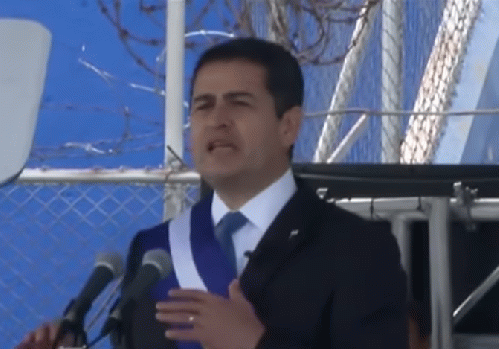This piece was reprinted by OpEd News with permission or license. It may not be reproduced in any form without permission or license from the source.
GREG WILPERT: Welcome to The Real News Network. I'm Greg Wilpert in Baltimore.
The protests against Honduras's President, Juan Orlando Hernandez, which have been going on for several months now, are showing no signs of letting up. If anything, they have been intensifying ever since it became known last week that Hernandez was involved in a conspiracy to use drug trafficking money to support his 2013 presidential election campaign. That is, on August 3rd, the television channel Univision published a report that cited documents related to his brother's drug trafficking trial in the United States. According to these documents, Hernandez's brother, Tony Hernandez, has been involved in drug trafficking since 2004. As a drug trafficker, he funneled $1.5 million to the presidential campaign of his brother.
President Hernandez, however, has vehemently denied the accusations. Here's what he had to say, followed by a response from Salvador Nasralla, the opposition from the Opposition Alliance who ran against Hernandez in 2017.
JUAN ORLANDO HERNANDEZ, PRESIDENT OF HONDURAS:
These accusations are categorically false and perverse, made up by a drug trafficker called Alexander Ardà �n. They want revenge against the only president who's done what he's needed to do. They're trying to stop us in our fight against drug trafficking, but we're not going to stop.
SALVADOR NASRALLA, OPPOSITION LEADER: We live in a country that is a narco-state, where the Supreme Court of Justice, the Public Ministry, Congress, and the Armed Forces are used for drugs to cross the border. Drugs have been crossing through Honduras since 2002. Seventeen years of it, seventeen years of money being handed to politicians.
GREG WILPERT: Joining me now to discuss the protest against Honduras's President, Juan Orlando Hernandez, and the allegations against him, are Jesse Freeston and Adrienne Pine. Jesse is a filmmaker based in Montreal, Quebec and the director of the film Resistencia, a documentary about the resistance to the 2009 coup against Honduras's President Manuel Zelaya. And Adrienne is Associate Professor of Medical Anthropology at American University who has worked extensively in Honduras. Adrienne joins us from Tegucigalpa, Honduras, and Jesse from Montreal.
Thanks for being here today, Jesse and Adrienne.
JESSE FREESTON: A pleasure.
ADRIENNE PINE: Thanks for having us.
GREG WILPERT: So before we get into the background of the latest developments, let's take a quick look at what's been going on in terms of the protests. Adrienne, let's start with you. Last week you were in the middle of the protest filming them, and you were attacked by the police. Tell us about what happened.
ADRIENNE PINE: Sure. Well, actually I experienced repression, I documented repression on two occasions last week. The first one was on Tuesday when, at the end of a massive protest that left from the National University and ended up in the Congress building, police and soldiers began very heavily repressing, even using an enormous tear gas or sorry, tank, to repress the protesters. And actually the following day as well I documented that same tank, hours of tear gassing and repression at the university. The following day, Thursday, I went to meet with students at the university, the National University, former students of mine, and the police started repressing students there who were protesting against the regime and the privatization of healthcare and education. And I went up close because what I saw was that the police were throwing dozens of rocks at the protestors, using deadly force in addition to the tear gas canisters. And so I went toward the main gate of the university to document.
I was live streaming when the students started shouting to the police officers, "Look, there is a human rights defender. A gringa is filming you," basically saying, "You should stop throwing these rocks because that's illegal." And so [inaudible] nd they started targeting me specifically. So what you're looking at right now is video of my foot, my leg. And I had to run behind that tree you're seeing and then behind a wall to protect me. I was very nearly killed on at least a dozen occasions when the rocks were whizzing past me. It was terrifying. And they were attacking me because they thought I was a human rights worker, specifically.
GREG WILPERT: Wow. So Jesse, now, there has been opposition against President Hernandez ever since he was elected in what most observers call a fraudulent election in 2017, actually was re-elected at that point. What have the protests been about since then? And how has the movement against him evolved leading up to today?
JESSE FREESTON: Well, I would say that ever since the coup in 2009 there's been a series of waves of movements and protests. And they typically start out when the government fails to do some basic thing that governments are supposed to do. And typically that has to do with healthcare and education. And so, most recently we've seen for the first time ever the doctors get organized and go on strike, and organize protests, and take the streets, and take over highways, together with the teachers, who have a long history of doing that and have achieved kind of their middle-class status in Honduras in large part through these kinds of actions.
(Note: You can view every article as one long page if you sign up as an Advocate Member, or higher).






